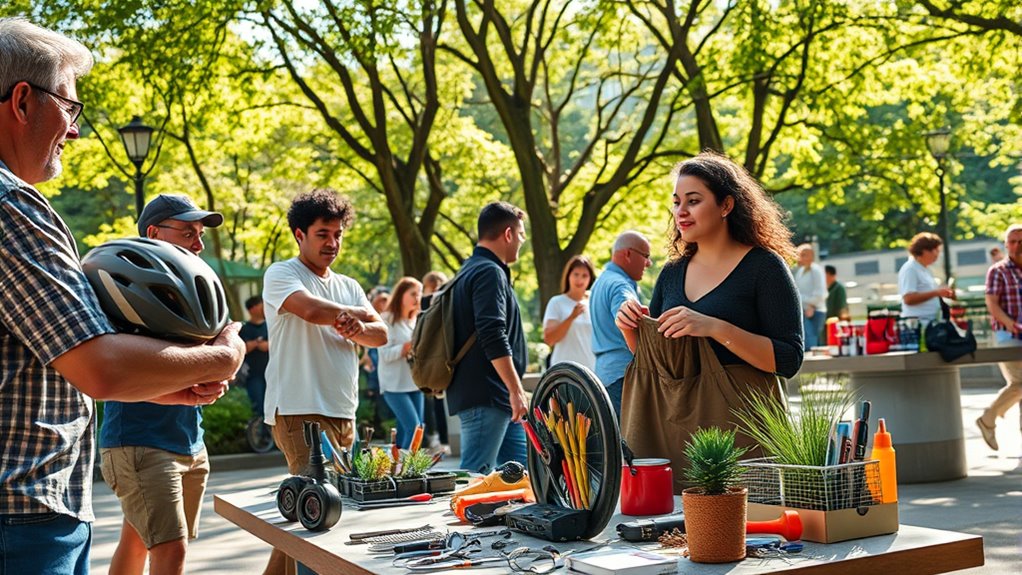The sharing economy allows you to borrow, lend, and swap items through online platforms, helping you cut consumption and live more sustainably. By sharing tools, clothes, or transportation, you save money and reduce waste while strengthening your community bonds. This approach promotes resource efficiency and eco-friendly living without sacrificing convenience. If you stay engaged, you’ll discover how embracing these practices can transform your lifestyle and contribute to a more sustainable future.
Key Takeaways
- The sharing economy promotes borrowing, lending, and swapping to reduce individual ownership and overall consumption.
- Peer-to-peer platforms facilitate easy, transparent exchanges that extend product lifespans and minimize waste.
- Sharing resources lowers demand for new manufacturing, decreasing environmental impact and conserving materials.
- Borrowing items from neighbors fosters community connections and supports sustainable living practices.
- Using shared services like ride-sharing and rentals offers affordable, flexible transportation options that reduce car ownership needs.

Have you ever wondered how people are increasingly turning to peer-to-peer platforms to access goods and services? This shift is at the heart of the sharing economy, where borrowing, lending, and swapping help reduce overall consumption. One of the most noticeable areas of change is urban mobility. Instead of everyone owning a car, more city dwellers are opting for peer-to-peer services like ride-sharing apps or bike rentals. These platforms allow you to access transportation on demand without the costs and responsibilities of ownership. You can easily find a ride when needed or rent a bike for a quick trip, making travel more flexible and affordable. This not only cuts down on individual expenses but also eases traffic congestion and decreases pollution, which benefits the entire community.
Peer-to-peer services are transforming how you think about ownership. Instead of purchasing items you’ll only use occasionally, you can borrow things from neighbors or community members. Need a power drill for a weekend project? Instead of buying one, you might find someone nearby willing to lend it to you through a local sharing platform. This approach helps you save money and reduces waste, as items are reused rather than discarded after a single use. Swapping goods or services also fosters stronger local connections, creating a sense of community and shared responsibility. It encourages a culture of collaboration, where resources are used more efficiently, and everyone benefits from reduced consumption. Additionally, innovative electric bike conversion kits are making eco-friendly transportation more accessible and customizable for urban commuters.
Borrow items from neighbors to save money, reduce waste, and build stronger community connections.
Online platforms make it incredibly easy for you to participate in this sharing economy. Whether you’re looking to rent out your parking space, share your tools, or lend your bike, these peer-to-peer services connect you directly with others in your area. This direct exchange eliminates middlemen, lowering costs for both parties and promoting transparency. By choosing to borrow or lend instead of buy, you’re actively contributing to a more sustainable way of living. You’re also helping to extend the shelf life of products, which reduces waste and environmental impact over time. This approach is supported by the fact that resource sharing can significantly decrease the demand for new manufacturing, thus reducing environmental strain. Moreover, awareness of local divorce statistics can guide community initiatives that support sustainable living and resource sharing. Strengthening trust between community members is essential for the success of sharing initiatives, fostering a safer and more cooperative environment. You’re helping to cut down on the environmental impacts associated with manufacturing and waste, all while building a more connected community.
The appeal of the sharing economy lies in its practicality and positive impact. It offers a way to cut consumption without sacrificing convenience or quality of life. As more people embrace peer-to-peer services, urban spaces become more livable, resource use becomes more efficient, and you become part of a movement that values sustainability and community. It’s a simple shift that can make a big difference—saving you money, reducing environmental strain, and strengthening your local ties—all by borrowing, lending, and swapping within your community.
Frequently Asked Questions
How Does the Sharing Economy Impact Traditional Rental Businesses?
You might notice that the sharing economy causes market disruption for traditional rental businesses by introducing peer-to-peer dynamics. Instead of relying solely on companies, people now rent, lend, or swap directly with each other. This shift reduces demand for conventional rentals, forcing businesses to adapt or innovate. As a result, traditional providers face increased competition, lower profits, and the need to rethink their strategies to stay relevant in this evolving market landscape.
What Legal Regulations Govern Sharing Economy Transactions Worldwide?
You should know that legal regulations governing sharing economy transactions vary worldwide, often presenting regulatory challenges and liability issues. Many countries struggle to create clear rules for peer-to-peer platforms, addressing concerns like safety, insurance, and consumer protection. As a participant, you need to stay informed about local laws, as regulations can differ considerably, impacting how you lend, borrow, or swap items within these platforms.
How Do Trust and Safety Concerns Affect Sharing Platform Growth?
Trust and safety concerns play a vital role in sharing platform growth. When you prioritize trust verification and implement safety protocols, you create a secure environment that encourages more users to participate. This builds confidence, reduces fears of fraud or damage, and attracts new members. Conversely, neglecting these aspects can slow growth, as users hesitate to share or borrow resources. Strong trust measures are essential for expanding the sharing economy successfully.
What Are the Environmental Benefits of Participating in Sharing Economies?
Did you know that sharing economies can reduce carbon emissions by up to 30%? By participating, you directly benefit the environment through resource conservation and decreased waste. Sharing platforms promote the efficient use of items, lowering the need for manufacturing new products. This sustainable approach helps cut down on environmental impact, making a positive difference. Your involvement supports a greener future while saving money and fostering community connections.
How Do Sharing Economies Influence Local Community Relationships?
Sharing economies strengthen local community relationships by fostering community bonding and social cohesion. When you participate, you interact more with neighbors, share resources, and support each other’s needs. This creates trust and a sense of belonging, making your neighborhood more connected. As you collaborate through sharing, you help build a resilient community where everyone feels valued and engaged, ultimately enriching local social fabric and fostering long-term relationships.
Conclusion
By embracing the sharing economy, you open the door to a world where resources flow freely like a gentle river, reducing waste and saving money. Imagine your belongings becoming bridges rather than barriers—connecting you to others and creating a tapestry of community. When you borrow, lend, or swap, you’re not just cutting consumption; you’re planting seeds for a sustainable future. So, step into this movement and watch your impact blossom like a vibrant garden in full bloom.









